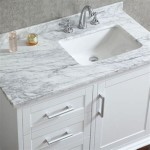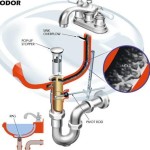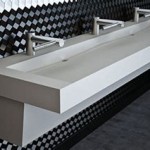Mildew Smell in Bathroom Sink: Causes and Solutions
A musty, earthy odor emanating from your bathroom sink can be a frustrating and unpleasant experience. It's important to address this issue promptly, as it can indicate potential plumbing problems and contribute to an unhealthy environment. This article will delve into the common causes of mildew smells in bathroom sinks, explore effective solutions, and provide preventive measures to keep your bathroom fresh and odor-free.
Causes of Mildew Smell
Mildew is a type of fungus that thrives in damp, humid environments. Its presence often results in a distinctive musty odor. Several factors can contribute to the development of mildew in bathroom sinks:
- Poor Ventilation: Insufficient ventilation allows moisture to accumulate, providing an ideal breeding ground for mildew. This can be caused by a lack of exhaust fans or inadequate air circulation.
- Water Leaks: Leaky faucets, pipes, or drain traps can create constant moisture, leading to the growth of mildew.
- Stagnant Water: Water left standing in the sink, particularly if it contains soap residue or other organic matter, can become a breeding ground for bacteria and mold, contributing to the mildew smell.
- Clogged Drain Traps: A clogged drain trap can prevent proper water drainage, allowing moisture to linger and encourage mildew growth.
- Use of Cleaning Products: Some cleaning products contain chemicals that can react with water, creating a musty odor that resembles mildew.
Solutions to Eliminate Mildew Smell
Addressing the underlying cause of the mildew smell is crucial for long-term odor control. Here are some effective solutions:
- Improve Ventilation: Ensure adequate ventilation by using an exhaust fan during and after showering or bathing. Open windows for air circulation when possible.
- Repair Leaks: Promptly repair any leaky faucets, pipes, or drain traps to eliminate the constant source of moisture.
- Clean the Sink Regularly: Wipe down the sink after each use to prevent the accumulation of soap residue, hair, and other debris. Use a mild cleaning agent and rinse thoroughly.
- Clean the Drain Trap: Regularly clean the sink drain trap to remove debris and prevent clogs. This will allow water to drain effectively, reducing moisture buildup.
- Use a Deodorizer: Consider using a drain deodorizer to eliminate odors within the plumbing system. Follow product instructions carefully.
- Use White Vinegar: Pour one cup of white vinegar into the sink drain and let it sit for 30 minutes before flushing with hot water. Vinegar's acidity can help neutralize odors and kill mildew spores.
Preventive Measures
Once the mildew smell has been eliminated, taking preventative measures is crucial to avoid its recurrence. Here are some practical steps:
- Regular Cleaning: Clean your bathroom sink and drain regularly to prevent the buildup of debris and moisture.
- Dry the Sink: Always dry the sink after use, ensuring that no water is left standing.
- Keep Drain Trap Clean: Clean the drain trap every few months to prevent clogs and ensure proper water drainage.
- Use Natural Products: Choose cleaning products that are free of harsh chemicals that can react with water and contribute to odors.
By understanding the causes of mildew smells in bathroom sinks and implementing these practical solutions and preventive measures, you can maintain a fresh and odor-free bathroom environment. Remember to address any underlying plumbing issues promptly to ensure a long-term solution.

What To Do When The Bathroom Sink Smells Like Mildew Mold Smell

Moldy Smelling Water From Bathroom Faucet Hometalk

What To Do When The Bathroom Sink Smells Like Mildew Mold Smell

Mildew Smell Under Bathroom Sink Tiktok Search

Why Your Bathroom Sink Drain Smells

How To Clean A Stinky Sink Drain Home Repair Tutor

Why Is There A Smell Under My Sink

How To Clean A Stinky Sink Drain By Home Repair Tutor

Help My Bathroom Smells Musty What Should I Do Phyxter Home Services

Bathroom Smells Like Sewage Causes Fixes Inside Out
Related Posts







